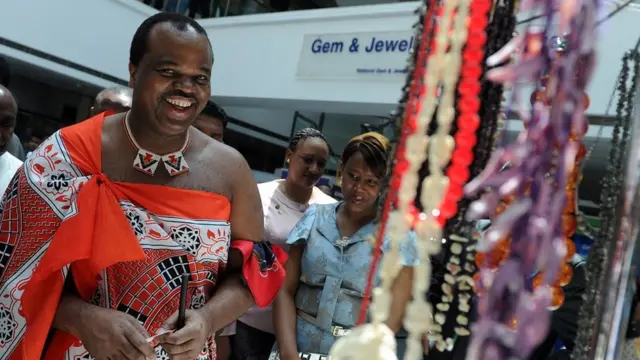A resurfaced video of Africa’s last absolute monarch, King Mswati III of Eswatini (formerly Swaziland), has gone viral on social media, sparking widespread debate over royal privilege and public hardship.
The footage, originally recorded in July, shows the monarch landing in Abu Dhabi, surrounded by a lavish entourage of 15 wives, nearly 100 attendants, and 30 children. The king, dressed in traditional Swazi attire, is seen walking down the private jet steps with full ceremonial grandeur, while airport staff and officials look on.
Royal Arrival Causes Stir Online
The video, which re-emerged recently across TikTok, X (formerly Twitter), and Instagram, shows part of the Abu Dhabi International Airport temporarily closed to accommodate the royal family’s arrival. According to the captions circulating online, entire terminals were restricted for security reasons, giving the monarch and his entourage exclusive use of airport facilities.
Social media users were quick to react — many condemning the extravagance. “When citizens are deprived of basic needs like electricity and clean water, this royal display feels insulting,” one user commented. Another quipped sarcastically, “Does the king have a manager to keep track of all his wives and children?”
The video’s renewed circulation has reignited a broader discussion about the stark contrast between Eswatini’s ruling elite and its impoverished population.
A Monarchy Rooted in Tradition — and Controversy
King Mswati III ascended to the throne in 1986 at the age of 18, following the death of his father, King Sobhuza II, who reportedly had 125 wives. Continuing that legacy, Mswati is known to select a new bride each year during the country’s traditional “Reed Dance” ceremony — an event where thousands of young women perform before the monarch.
Supporters of the king argue that such customs reflect Swazi cultural heritage and national identity. However, critics say the opulence surrounding the royal family has become a symbol of excess and inequality.
The monarch, now in his mid-fifties, has faced repeated accusations of misusing public funds to maintain a lavish lifestyle. His personal wealth is estimated at over US$1 billion, derived from investments in telecommunications, real estate, agriculture, and tourism, while much of the nation struggles economically.
Economic Disparities and Public Frustration
Despite the king’s immense fortune, Eswatini — a small, landlocked nation of 1.2 million people — continues to grapple with widespread poverty and unemployment. According to the World Bank, more than 60% of the population lives below the poverty line, while unemployment has reached around 33%.
Public hospitals often face severe medicine shortages, and education funding has declined sharply in recent years. Analysts say the pandemic further deepened the financial crisis, with little evidence of government relief reaching the poor.
Economists argue that Eswatini’s dual economic structure — where royal enterprises dominate key industries — leaves little room for independent growth. “It’s a system designed to keep power and wealth concentrated at the top,” said a South African political analyst.
Cultural Symbol or Public Exploitation?
Defenders of King Mswati maintain that his leadership is guided by tradition and divine right, positioning the monarchy as a unifying force in the country. They insist that criticism from outsiders fails to appreciate Eswatini’s unique cultural context.
However, domestic and international rights groups disagree. They describe the king’s displays of luxury as public exploitation, particularly when basic needs remain unmet for most citizens. The king’s recent appearance in Abu Dhabi has once again highlighted what many call a “nation of two worlds” — one behind the golden gates of the royal palace, and another struggling to survive in deepening poverty.
As the video continues to circulate, it has reignited long-standing calls for political reform and accountability in one of Africa’s few remaining monarchies.















